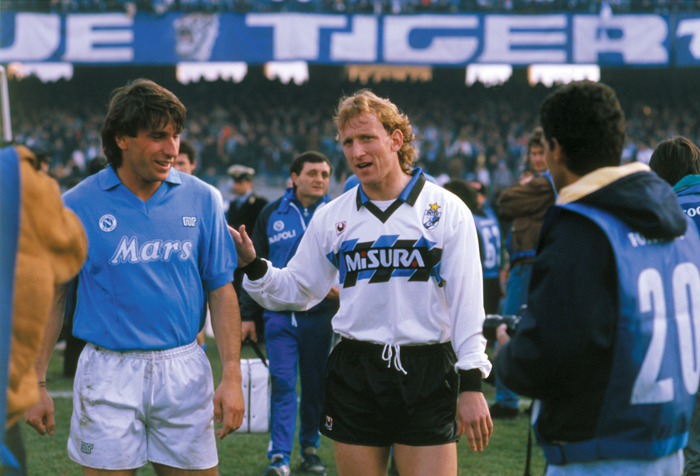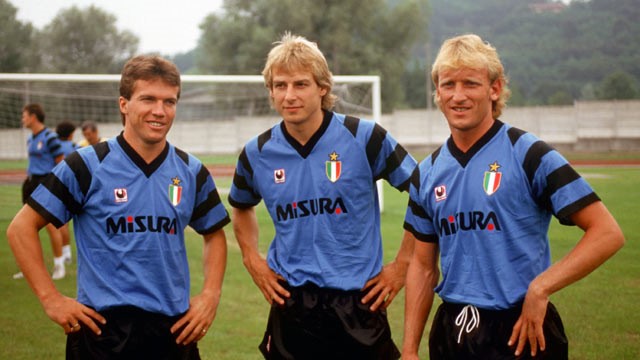It is a strange phenomenon that sometimes arises and, where it does, there are various factors that affect its exact nature. Look through the annals of clubs the world over and you will often find their histories littered with players and coaches from a specific foreign land. Though initially hard to comprehend the reason for this existing affinity, dig a little deeper and there is usually a pivotal moment in each club’s history that signals the beginning of a long romance with somewhere exotic.
Perhaps the most recent and well-known example of this on British shores was the French colonisation of North London that occurred in the 1990s and 2000s. Arriving 20 years ago, Frenchman Arsene Wenger ushered in one of the greatest eras in Arsenal’s history, using a number of his compatriots to do so. Nicolas Anelka, Emmanuel Petit, Patrick Viera, Robert Pires and Thierry Henry were just some of the names on a long list of French nationals who turned out for the Gunners during that time, winning multiple titles and reaching a European Cup final in the process.
There is also a distinctly Dutch flavour in Catalonia. Johan Cruyff’s immeasurable impact at FC Barcelona is the most obvious reason for that particular relationship and it is one that has continued throughout the years. Players such as Ronald Koeman, Edgar Davids, Marc Overmars and Phillip Cocu have added that hint of orange to the famous blue and red shirt – all with varying levels of success.
AC Milan have also played with somewhat of a Dutch persuasion over the years. Most famously, this was at its height during the late 1980s under Arrigo Sacchi, who led a team of Netherlands natives that included Marco Van Basten, Frank Rijkaard and Ruud Gullit. Across the city from the Rossoneri, however, there has been an equally strong and perhaps more enduring love affair.
Internazionale have had a German essence since the signing of Horst Szymaniak in the summer of 1963. Brought to the Stadio Giuseppe Meazza by the great Helenio Herrera, he arrived with much expected of him. Szymaniak had been considered one of the Bundesliga’s leading lights prior to his move to Italy but his time in the famous black and blue shirt would not prove as fruitful. A powerful defensive midfielder with an ability to control a game through his exceptional passing ability, the West Germany international would go on to make only six appearances for the Nerazzurri. He would leave after one season in Milan, having been overlooked for selection in a side that would become European Champions in 1963-64, beating Real Madrid in the final.
Thankfully, Inter’s fortune with Germans would take a remarkable upturn, albeit it took the best part of two decades to do so. Following on from Hans Muller, who made 48 appearances between 1982 and 1984, Karl-Heinz Rummennige arrived from Munich giants FC Bayern in the summer of 1984. Then aged 29, he joined the San Siro outfit a proven goal-scorer and an established international. Having scored an incredible 162 goals in 310 games for Bayern, Rummenigge had garnered himself a reputation not only as a lethal finisher, but also as a well-rounded and near-complete centre-forward. Ballon D’Or and European Footballer of the Year awards in the early 1980s had already laid testament to that.
Rummenigge’s decision to join Inter came at the pinnacle of his career, following a decade of trophy-laden success in his homeland. Such a reputation meant he could have gone anywhere upon leaving Bayern, but when he spoke to Inter Channel in 2015, he alluded to the club’s own prestige as a vital pull factor. Reflecting on Xherdan Shaqiri’s decision to make the same switch, he said:
“It’s very simple: the boy only wanted to join Inter and it was the same for us. End of story. I also refused half the continent back in the day so I could join Inter. Inter are Inter.”
Unfortunately for the forward, his time in Italy would not match previous achievements. Though he achieved a respectable 24 goals in 64 appearances, these appearances were stretched over a three-year period that was blighted by injury. Rummennige would eventually leave Inter in 1987 having won no major honours. Nevertheless, he is remembered fondly by the Inter faithful.
So far, so unremarkable for the German migrants calling Inter home. That, however, would all change in the late 1980s, with no less than three Germans changing the course of Inter’s history. After years without success and honours, a situation unfamiliar in the blue half of Milan, three men would help return the club to its former glory.
The first two were Lothar Matthäus and Bayern teammate Andreas Brehme. Signing for the club in the summer of 1988, they had an immediate impact. In their first season playing for the Nerazzuri, they brought the Scudetto back to San Siro along with the Italian Super Cup.
Matthäus, in particular, did much on an individual level to draw the focus of the footballing world back to Inter. The midfielder won the Ballon D’Or and FIFA World Player of the Year award in separate years, but both as an Inter player. To this day, he remains the only player to win the Ballon D’Or whilst playing for Inter. Around the same time, he became a World Cup winner with his national team in the same country he played his club football, at Italia 90.
Brehme, meanwhile, though having a lower profile than his compatriot, arguably contributed as much to Inter’s success. A left-sided midfielder and defender, he made over 100 appearances in the black and blue and, like Matthäus, was part of the World Cup winning Germany side of 1990. The highlight of the pair’s four-year stint in Italy would come in 1991 when, under the guidance of the great Giovanni Trapattoni, they helped secure the UEFA Cup in a 2-1 aggregate final victory over rivals Roma.

The TGU Interview: Andres Brehme – Inter’s pioneering full-back
Leading the line in that successful side was the third of the German contingent at Inter. Jurgen Klinsmann had arrived in Milano from VfB Stuttgart in 1989, yet to win any major silverware in his career. This would change drastically for the 25-year-old striker. Like compatriots Matthäus and Brehme, Klinsmann won the Italian Super Cup and UEFA Cup under the tutelage of Trapattoni and become a World Cup in 1990.
In fact, for Klinsmann, his time at Inter would prove a springboard for the rest of his career. He left the club with a respectable 34 goals in 95 appearances to return to his native Germany, where he would go on to secure his only Bundesliga title with FC Bayern, as well as another UEFA Cup. His trophy room is surprisingly bare for a player so fondly remembered but, with his iconic diving celebration and dynamic style of play, the man affectionately nicknamed ‘Flipper’, earned cult-hero status with spells at clubs such as AS Monaco and Tottenham Hotspur later in his career.
Unfortunately, the early 1990s is where the successful relationship between Germany and Inter peaked and began its sharp decline. Matthias Sammer followed teammate Klinsmann from Stuttgart but made only 11 appearances for Inter. Struggling to settle in Italy, and stymied by a fractious relationship with both the club and media, the defender left leaving no lasting impression on Serie A. Despite going on to enjoy enormous success with Borussia Dortmund in later years, it is fair to say that Sammer’s time at the Nerazzurri did little to preface what would follow for the East Germany-born footballer.
Lukasz Podolski is, at present, the last German to have donned Inter’s colours. Arriving on loan from Arsenal in 2015, he made only 17 appearances and scored a solitary goal. While it could be argued that his poor record was as much down to the turmoil ensuing off the field at the time, the player’s contribution meant his stay in Italy was short-lived.
Ties between foreign lands and clubs are a fascinating part of the footballing world. The relationships shared between some of the world’s great clubs and great nations can enjoy the types of peaks and troughs one might see in a movie romance. It is clear Germany and Inter are enduring a lull at present, but there is much to suggest they will fall giddily back in love in the future, just like it was in the 1980s. Don’t expect this 50-year relationship to head to the divorce courts just yet.

